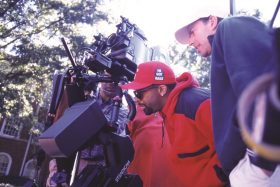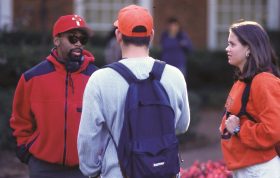In 1997 the film director visited campus to shoot several scenes from his movie, “He Got Game,” offering students a lesson in the realities of Hollywood productions.
By Xernay Aniwar ’17
Twenty years ago, film director Spike Lee brought his cameras, along with 60 cast and crew members, to Elon’s campus to film several scenes for his 1998 movie, “He Got Game,” starring Denzel Washington, Ray Allen and Rosario Dawson.

Shooting the film was Lee’s second visit to Elon. Several months prior, on Feb. 15, 1997, Lee spoke to students in Alumni Gym about Hollywood’s impact on society and the importance of education. After the event, he sat down for a quick exclusive with Tracey Stark, former managing editor at The Pendulum, to talk about basketball, Jerry Seinfeld and the controversial aspects of Lee’s films, to which he responded, “I don’t really even pay attention to words like controversial, those types of labels. I don’t pay attention to that stuff at all.”
The film is set in New York and follows the story of an estranged father and son as they navigate college basketball and corruption. A jailed man, played by Denzel Washington, is offered a reduced prison sentence by the governor if he is able to convince his son, the top-ranked basketball prospect in the country—played by real-life basketball legend Ray Allen—to play for the governor’s alma mater, “Big State.” The dilemma arises when Allen’s character is offered multiple scholarships, and must decide whether to help his father despite their strained relationship.
When choosing a filming location, Lee requested assistance from the Piedmont Triad Film Commission. Other considerations included Wake Forest University and Davidson College. In the end, Elon was chosen to represent “Tech University” in the film, one of many schools that Allen’s character is invited to visit. The scenes filmed on campus included shots around Alamance, Mooney and Long buildings, as well as Whitley Auditorium and McEwen Hall. The scenes called for 250 extras, which were filled by students. The process included a casting call, where the first 250 people to walk through the door would receive cards that told them when and where to go for their scenes. In addition to 200 silent walk-on roles, six students landed speaking roles and four communications students had the opportunity to shadow the film’s producer, Jon Kilik, for the day.

But not all students were happy with the filming arrangement. Several “Letters to the Editor” pulled from the Oct. 9, 1997, issue of The Pendulum, show that at least two students were quite vocal in their displeasure. “The administration was nice enough to allow them to film here at Elon,” wrote one student. “The least they could do is show some common courtesy for the students who pay about $15,000 to get an education here. We should not be yelled at for walking to our classes or trying to check our mail.” Another student agreed, writing, “I, myself, was unable to exit Duke and proceed to my next class without being literally hollered at by the crew involved with the filming, and have heard many similar stories.”
The students’ complaints prompted a response from Bill Webb, technical director and lighting designer at Elon. “I would like to take this opportunity to enlighten the disgruntled students about one of the realities about the motion picture industry,” he wrote in a letter featured in the student newspaper. “Schedules are subject to change, and frequently changes come at the last minute. I’ve rarely been involved in a production that has followed its original production calendar, and all the personnel involved must remain flexible.”
Lee’s filmography is extensive and often serves as a commentary on American culture, with a specific focus on African-American identity in America. His filming on campus gave Elon students at the time a closer, behind-the-scenes look at a Hollywood production.


